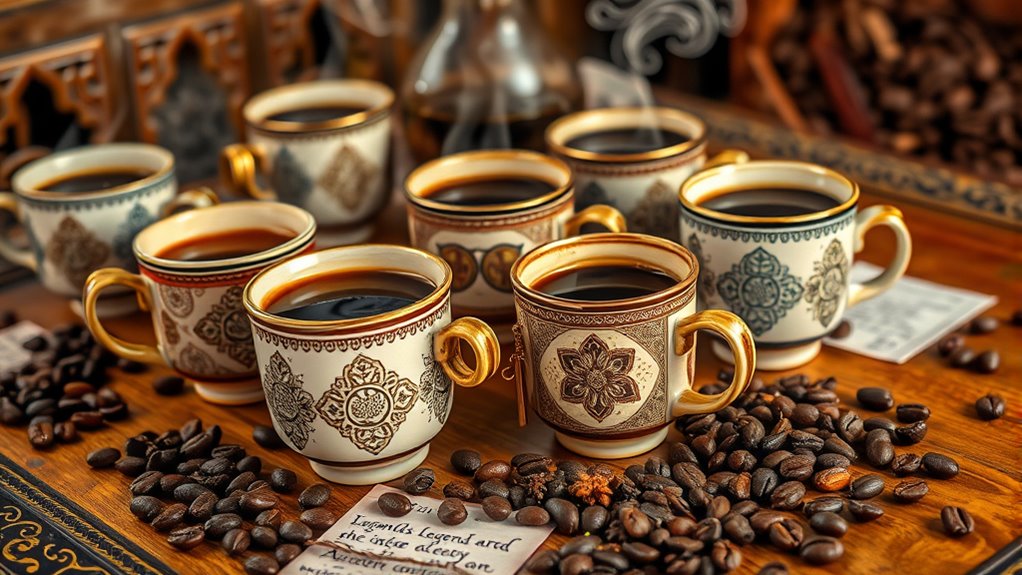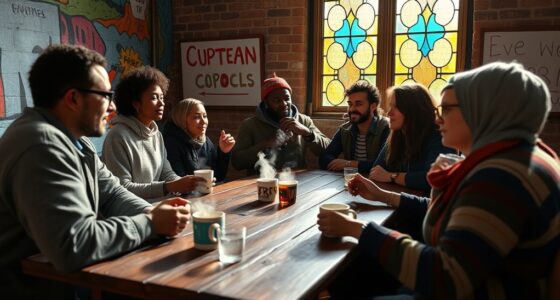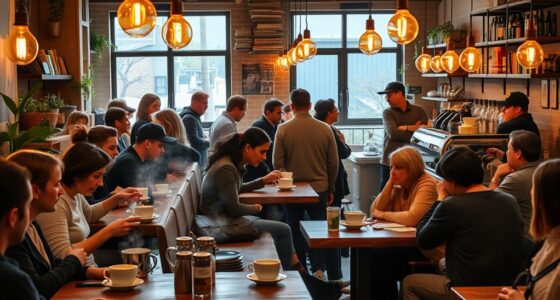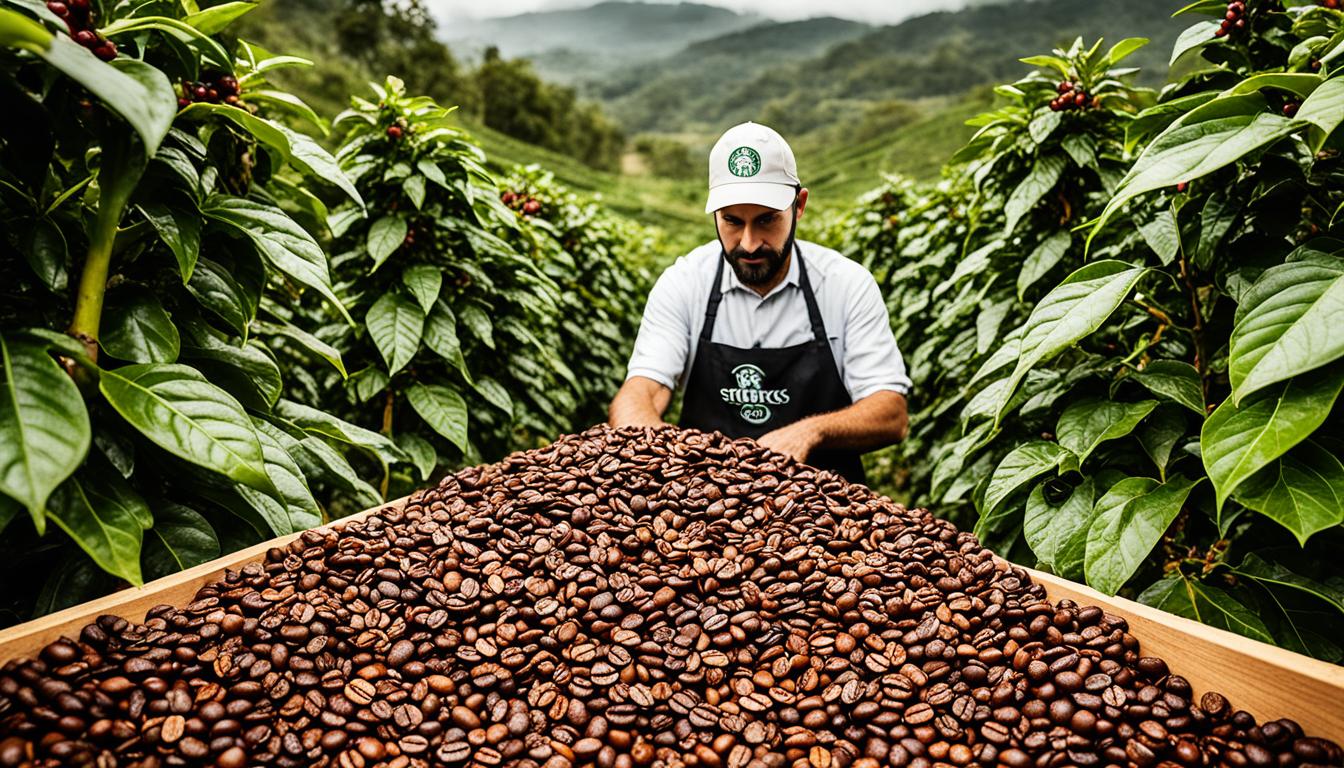Across cultures, coffee is more than a drink—it’s woven with superstitions and legends. From pouring coffee calmly to ward off bad luck, to reading grounds for future insights, its preparation and consumption are tied to spiritual beliefs and rituals. In many places, spilling coffee invites misfortune, while sharing it symbolized prosperity. These fascinating traditions reveal how coffee connects people to luck, protection, and ancient tales. Want to uncover more intriguing beliefs surrounding coffee worldwide? Keep exploring!
Key Takeaways
- In Turkish culture, pouring coffee steadily and calmly is believed to attract good luck and ward off misfortune.
- Coffee grounds are used in Ethiopia for divination, predicting future events and uncovering secrets.
- Spilling coffee is considered bad luck in some cultures, symbolizing the invitation of misfortune.
- Sharing coffee or leaving a little in the cup signifies prosperity and happiness in various traditions.
- Rituals like praying or making wishes before drinking coffee are believed to spiritually enhance luck and protection.

Coffee has long been wrapped in superstition and legend, blending daily ritual with mysterious beliefs. From the way you brew your coffee to the effects of caffeine, many cultures have woven stories that link this beloved beverage to luck, protection, or even fate. When you start your day with a cup of coffee, you’re not just energizing yourself—you’re participating in a tradition that spans centuries and continents, each with its own superstitions and legends. The process of coffee brewing itself is often considered more than just a routine; in some cultures, the method you choose can influence your fortune or ward off bad luck. For example, in Turkey, pouring coffee with a steady hand and a calm mind is believed to bring good luck, while spilling coffee is thought to invite misfortune. Similarly, the way you serve your coffee can hold symbolic meaning—leaving a little in the cup or sharing it with a loved one might be seen as a sign of prosperity or happiness.
Caffeine effects also play a role in these superstitions. Many believe that the boost of energy from caffeine can influence your mood and even your destiny. In some traditions, drinking coffee at just the right time or in specific quantities is thought to enhance your luck or protect you from evil spirits. For instance, in parts of Africa and the Middle East, coffee is more than a morning pick-me-up; it’s a tool for social bonding and spiritual protection. People hold the belief that caffeine can sharpen your intuition or reveal hidden truths, which is why some cultures perform rituals before drinking coffee—such as praying or making a wish. These rituals are believed to influence how caffeine affects you, not just physically but spiritually as well.
Across the world, legends tell that coffee can reveal your future. In Ethiopia, where coffee originated, the beans are often used in divination rituals. Pouring coffee grounds and interpreting the patterns is thought to predict upcoming events or uncover secrets. In Scandinavian countries, pouring coffee in specific cups and reading the leftover foam is considered a way to glimpse into one’s destiny. Even in the West, some believe that the way you react to the caffeine rush—whether with calm or agitation—can be a sign of your future outlook or luck. Additionally, the cultural significance of coffee influences how these superstitions are practiced and passed down through generations. In some traditions, the act of preparing and drinking coffee is a sacred ritual that connects individuals to their ancestors and spiritual beliefs. Furthermore, the history of coffee is filled with stories of legends and myths that continue to shape these beliefs today. As you enjoy your next cup, remember that countless beliefs intertwine with the simple act of brewing and drinking coffee, making each sip a small act of connecting to centuries of superstition and legend.
Frequently Asked Questions
Are There Any Modern Coffee Superstitions Still Believed Today?
You might wonder if modern rituals still involve superstitions about coffee. Today, some believe that brewing beliefs can influence your day’s luck, like avoiding certain cups or times for brewing. While many see these as fun traditions, others keep them alive as part of their daily routine. These modern superstitions add a playful, cultural touch to your coffee experience, blending tradition with contemporary life.
Which Countries Have the Most Unique Coffee-Related Legends?
Imagine wandering through vibrant markets where coffee rituals unfold like ancient stories. Countries like Ethiopia and Turkey boast the most unique coffee-related legends, where mythical brews are believed to bring luck or ward off evil spirits. These tales weave magic into every cup, transforming everyday coffee into a symbol of cultural identity. You can feel the rich history and folklore simmering in each sip, making these legends truly extraordinary.
Do Coffee Superstitions Influence Actual Coffee Brewing or Drinking Habits?
You might find that coffee superstitions do influence your brewing and drinking habits. Many people follow superstition rituals, believing they bring good luck or ward off bad luck, shaping how they prepare and enjoy coffee. For example, some avoid certain actions during brewing rituals or drink coffee in specific ways to honor these beliefs. These superstitions add a cultural layer that subtly guides your daily coffee routines.
Are There Any Famous Historical Figures Associated With Coffee Superstitions?
Imagine a legendary figure like Benjamin Franklin, who’s often linked to coffee myths—though not confirmed, he reportedly believed coffee sparked innovation. Famous historical figures like Franklin help shape legendary coffee myths, adding to the lore’s mystique. These stories influence how you view coffee’s cultural significance, blending history and superstition. While no concrete ties exist, their names help keep the legend alive, fueling your fascination with coffee’s mysterious, storied past.
How Do Coffee Superstitions Vary Between Different Cultures?
You’ll notice that cultural variations shape how different societies perceive coffee superstitions. In some places, superstitions originate from ancient beliefs about spirits or luck, influencing coffee rituals. For example, you might find that knocking three times symbolizes good fortune. These beliefs evolve from superstition origins, reflecting local traditions and history. By exploring these differences, you gain insight into how coffee is intertwined with cultural identity worldwide.
Conclusion
As you sip your coffee, remember these superstitions and legends weave a tapestry of cultures and beliefs, turning each cup into a storybook of traditions. Just like a delicate web connecting worlds, these fun ideas remind you that coffee isn’t just a beverage—it’s a bridge to history, hope, and mystery. Embrace the magic in every sip, knowing that each culture’s legend adds flavor to your daily ritual, making your coffee experience both rich and enchanting.









